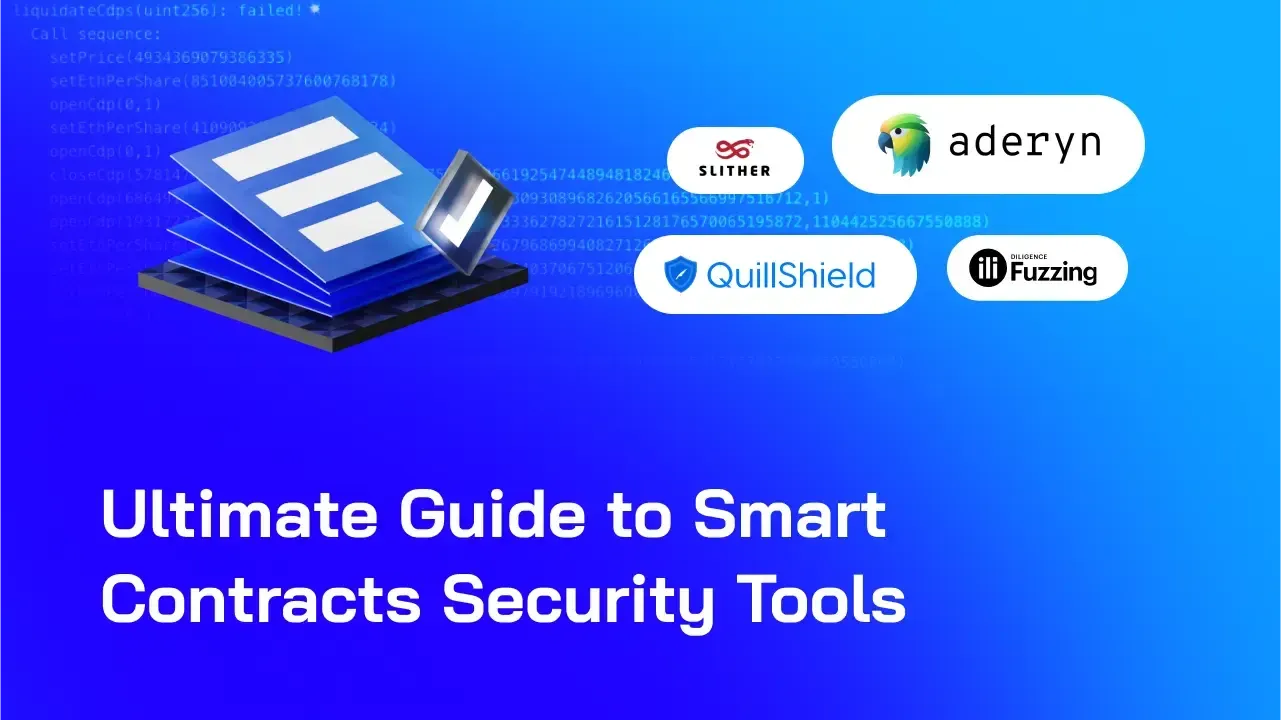Top 10 Smart Contract Security Tools in 2026 – The Ultimate Guide
Explore the top smart contract security tools for Solidity audits, bug detection, and blockchain security. Protect your dApps with these cutting-edge solutions.

Smart contract security is a critical aspect of blockchain development, as vulnerabilities can lead to devastating financial losses.
With millions of dollars at stake, developers and auditors rely on specialized tools to detect bugs, prevent exploits, and ensure contract reliability.
From static analysis and fuzz testing to formal verification and AI-powered audits, these tools play a crucial role in securing Web3 applications.
In this blog, we explore some of the most effective smart contract security tools available today, helping you choose the right ones to fortify your code.
The numbering is random, not based on which is better.
Echidna
Echidna is a property-based fuzzing tool for Ethereum smart contracts. Developed by Trail of Bits, it helps identify vulnerabilities by testing contracts against user-defined properties. It integrates coverage reporting to highlight which parts of the contract were tested.

Price: Free
Features:
- Property-based fuzzing to test unexpected inputs.
- User-defined assertions to check contract behavior.
- Source code analysis for test coverage.
Medusa
Medusa is an experimental smart contract fuzzer inspired by Echidna. It allows parallelized fuzz testing of smart contracts using CLI or Go API.

Price: Free
Features:
- Parallel fuzzing across multiple threads.
- Property and assertion testing for Solidity.
- Mutational value generation using runtime values.
- Coverage-guided fuzzing for deeper analysis.
Diligence Fuzzing
Diligence Fuzzing is a cloud-based fuzzing service by Consensys, powered by Harvey, a bytecode-level fuzzer for Ethereum. It integrates with Foundry and Scribble for automated testing.

Price: Free to $1,999
Features:
- Bytecode-level fuzzing for Ethereum contracts.
- Integration with Foundry and Scribble.
- Automated vulnerability detection.
Cyfrin Aderyn
Aderyn is a Rust-based static analysis tool that detects vulnerabilities in Solidity smart contracts. It traverses the AST and reports potential issues in markdown format.

Price: Free
Features:
- Fast detection with low false positives.
- CI/CD integration.
- Hardhat and Foundry support.
- Custom analysis framework via Nyth.
Slither
Slither is a Python-based static analysis tool by Trail of Bits. It provides vulnerability detection and integrates with CI pipelines.

Price: Free
Features:
- Fast execution with low false positives.
- Over 92 vulnerability detectors.
- Custom analysis via Python API.
- Hardhat, Foundry, and DappTools support.
Halmos
Halmos, developed by a16z, is an open-source formal verification tool for Ethereum smart contracts. It uses bounded symbolic execution to analyze contract logic.

Price: Free
Features:
- Symbolic execution for thorough testing.
- Avoids halting problem with bounded execution.
- Designed for formal verification.
Foundry
Foundry is a smart contract development and auditing framework. It includes tools for fuzz testing, deployment, and blockchain interactions.

Price: Free
Features:
- Forge for testing and fuzzing.
- Cast for contract interactions.
- Anvil as a local Ethereum node.
- Chisel for Solidity REPL testing.
Solodit
Solodit aggregates smart contract vulnerabilities and bug bounties from multiple sources. It serves as a research hub for auditors and security researchers.

Price: Free
Features:
- Database of 8,000+ vulnerabilities.
- Bug bounty tracking.
- Auditing checklists and competitions.
These tools cover different aspects of smart contract security, from fuzzing and static analysis to formal verification and vulnerability tracking.
Mythril
Mythril is a symbolic execution tool designed for smart contract security analysis. It explores multiple execution paths to detect vulnerabilities like reentrancy and integer overflows.

Price: Free
Features:
- Symbolic execution to uncover complex bugs.
- Supports EVM bytecode analysis.
- Detects gas limit issues and execution flaws.
- Compatible with Truffle and Hardhat.
QuillShield
QuillShield is an AI-powered security analysis tool that enhances smart contract auditing by detecting logical errors beyond common vulnerabilities.

Price: Free (Beta)
Features:
- AI-driven vulnerability detection for Solidity.
- Learns from past exploits to improve accuracy.
- Reduces false positives through consensus mechanisms.
- Integrates with existing security pipelines.
Conclusion
Smart contract security is an ongoing challenge, but the right tools can make a significant difference in identifying vulnerabilities before they are exploited.
Whether you're a developer testing your own contracts or an auditor conducting thorough security assessments, leveraging a combination of static analysis, fuzz testing, and formal verification ensures a more robust defense.
As the blockchain space evolves, so too will these security tools, continually improving to keep up with emerging threats. By integrating them into your workflow, you can build and deploy safer, more resilient smart contracts.
Contents




